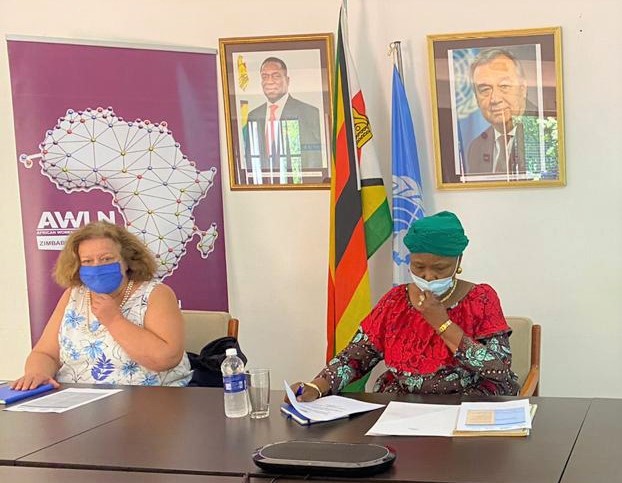Women are playing a critical role in the promotion of peace in Zimbabwe and the Southern African Development Community (SADC), Hon Oppah Muchinguri-Kashiri, the Minister of Defence and War Veterans said in a keynote address at the 20th anniversary of UN Security Council Resolution 1325 held virtually today.
This webinar provided an opportunity for stakeholders to introspect on the past, the present, and future in relation to developing plans of actions to improve efforts towards Women, Peace, and Security as stipulated by the UNSCR 1325.
Minister Muchinguri-Kashiri said the UN Security Council Resolution 1325 reaffirms the important role of women in the peace and conflict management processes despite the fact that its full implementation remains work in progress on the African continent as a whole.
“It is disheartening to accept the factual notion that despite the promulgation of resolution 1325 some 20 years ago, women’s participation in peace and security still remains more symbolic than substantive. Local cultural norms and patriarchal hierarchies remain obstacles in most African societies for women to meaningfully influence and participate in peace negotiations.
“However, despite these challenges, some substantial progress has thus far been registered in the implementation of UNSCR 1325 on the African continent,” Hon Muchinguri-Kashiri said.
The Minister said the African Union, Regional and national institutions have produced relevant policy frameworks and mechanisms such as;
- the African Charter on People and Human Rights (1981),
- the Maputo Protocol to the African Charter on the Rights of Women (2003),
- the Solemn Declaration on Gender Equality in Africa (SDGEA, 2004), and
- the Southern African Development Community (SADC) Protocol on Gender and Development (2008).
In addition, some member states have created national gender commissions which all seek to promote women’s empowerment, their protection, and their participation in peace and security processes.
She bemoaned the fact that such efforts have not, however, overcome the patriarchal ideologies and values embedded in most African societies which along with weak political will, continue to undermine gender mainstreaming.
“Women’s low levels of participation in politics and peace processes, limited awareness of the UNSCR 1325 at the grassroots level, lack of a critical mass of women’s voices and experts in African peace and security and a shortage of dialogue, collaboration, and strategic networking among women’s organizations are also challenges which need to be effectively addressed as we critic and commemorate the 20th anniversary of the UNSCR 1325.”
Ms. Maria Ribeiro, the UN Resident Coordinator for Zimbabwe said in line with the theme “UNSCR1325 @ 20: Lessons learnt from Women Peace-builders and Nurturing the Next Generation of Peace-builders in SADC and Zimbabwe,” it is important to appreciate the experiences of women peacebuilders within the region and reflect or take stock of progress made in the implementation of 1325 throughout SADC so as to learn from the past in order to build better for the future.
She said another key aspect that emerges from the theme is that of encouraging the values for peacebuilding, tolerance, and social cohesion in young people, who are the future generation of peacebuilders. This year the commemoration is against the backdrop of the COVID 19 pandemic, which has exacerbated women’s vulnerabilities in the private and public spheres, clearly highlighting the importance of women’s leadership in peacebuilding processes.
“At the continental level the African Union Commission, through the coordination of the Office of the Special Envoy on Women, Peace and Security, formulated a Continental Results Framework to monitor the implementation of commitments on women, peace and security in Africa by AU Member States and other relevant stakeholders,” Ms Ribeiro said.
In Southern Africa, the SADC Regional Strategy on Women, Peace and Security (2018-2022) was adopted to lend context, substance and ensure the participation of women and children in peace and security activities, programmes and project across the region.
However, in spite of the existence of these crucial frameworks, on average, globally, between 1992 and 2019 women contribute only 13 per cent of negotiators, 6 per cent of mediators, and comprise only 6 per cent of signatories in major peace processes.
At the SADC level, high ranking women in the security sectors of SADC Member States remains low with few women leading key negotiation and mediation processes.
At the grassroots level, women and youth have limited effective spaces and opportunities to contribute towards peace-building processes at national level with states.
“The platform created by this commemorative event works to initiate critical conversations around the implementation of 1325, and the involvement of women and youth to participate in advancing the peace and security agenda. By engaging participants as well as speakers from across the SADC region, it is envisaged that critical exchanges and sharing of experiences will take place to foster the development of a roadmap and actions in charting the path for the next decade of implementing 1325,” Ms Ribeiro added.






